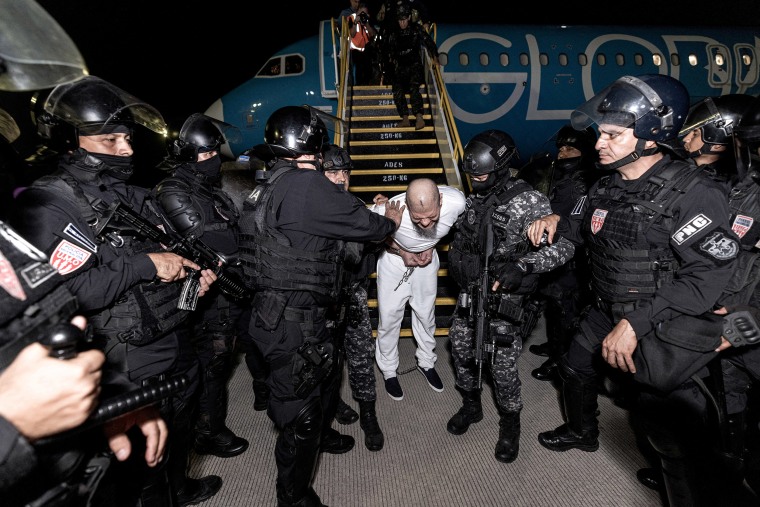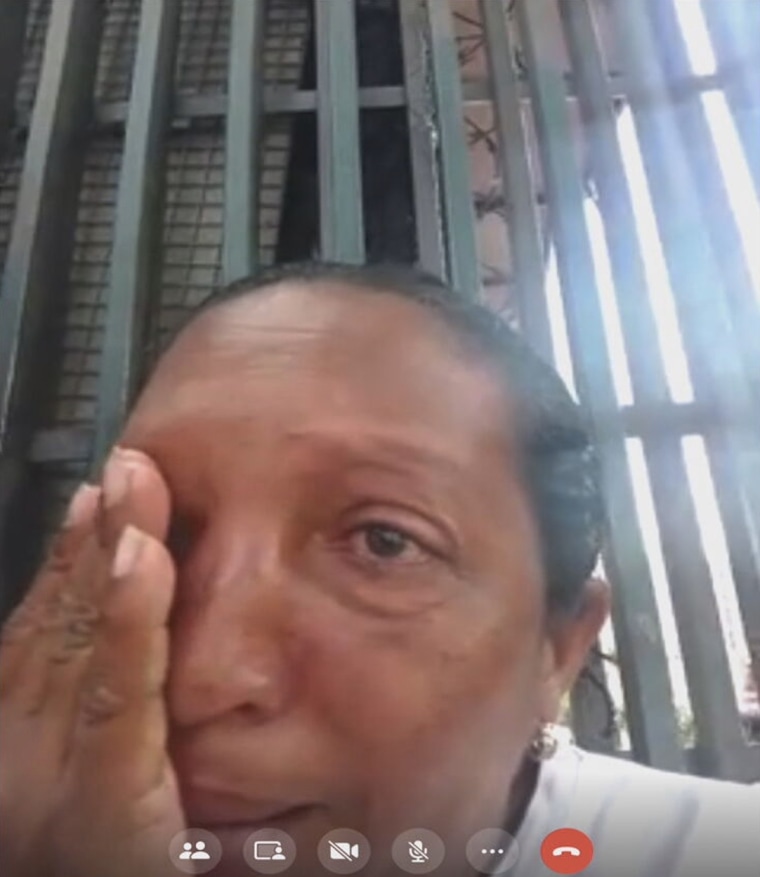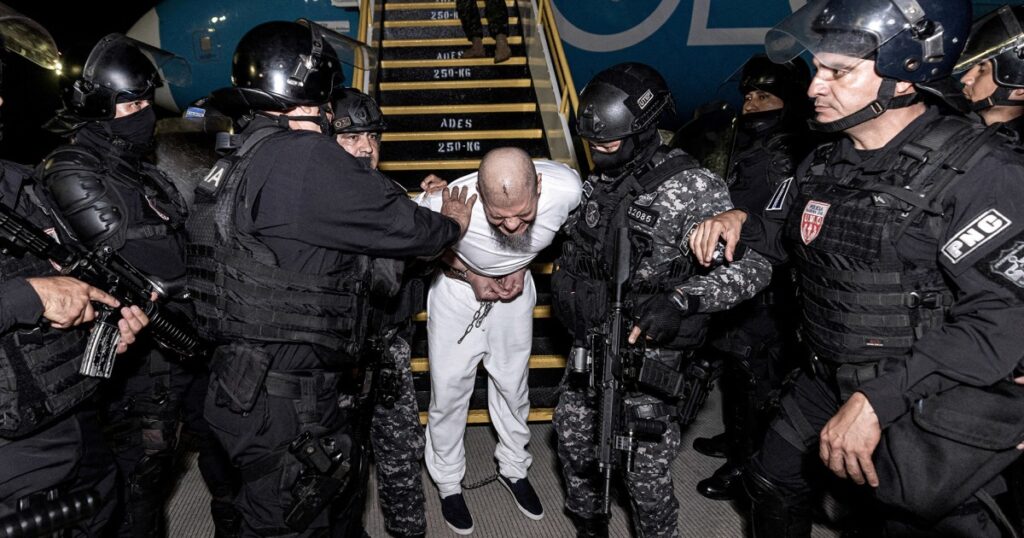On March 15, the Trump administration loaded more than 200 men onto three planes bound for El Salvador, where they were to be locked in its notorious CECOT prison. A video of the men being marched, head-down, into police vehicles and into the facility ricocheted around the world, a symbol of the United States’ position on immigrants it accuses of having gang ties.
Hidden from the camera were eight women who were also on the planes but never got off. Shortly after they landed, according to court filings, El Salvador apparently refused to take them. So they were shipped back, to be locked up again on American soil.
Now, for the first time, two of those women are speaking out in an interview with NBC News, describing the chaos they witnessed during the Trump administration’s deportation efforts and how, they allege, Immigration and Customs Enforcement officials deceived them about where they were being taken.
“We were lied to,” said one of the women, Heymar Padilla Moyetones, 24. “They told us we were going to Venezuela, and it turns out that, no. When we arrived at our destination, that’s when they told us we were in El Salvador.”
Trump administration officials have said all of the people it has sent to El Salvador were Venezuelans who were carefully vetted and had clear ties to Tren de Aragua, a gang from Venezuela that the administration has designated a terrorist organization.
But the vetting process apparently did not include determining whether El Salvador would accept female detainees.
Moyetones said ICE officials kept her on the aircraft. “They didn’t let us leave. They told us that we were going back, that we were coming back here,” she said.
The incident is the latest example of the haphazard nature of the flights to El Salvador. In a separate case, the government has acknowledged it erred in sending Kilmar Abrego Garcia, a man married to a U.S. citizen, on those same planes despite a court order that blocked his being deported to El Salvador because of the likelihood he would be targeted by gangs there. Family members say and court records show the administration relied on tattoos to identify gang members, even though experts say that method is unreliable. The administration has not acknowledged the women’s situation.
This account is based on an interview with Moyetones and another woman who was flown to El Salvador, Scarleth Rodriguez, both of whom spoke to NBC News from the cell they share in a detention center in Laredo, Texas. The women have quickly grown close to each other, bonded by their shared experience. They and their cellmates crowded around a video tablet in their cell for the interview, fixing one another’s hair and clothing, giggling about how shy they felt and occasionally encouraging one another to keep describing what had happened to them.

Moyetones and Rodriguez both deny that they are associated with Tren de Aragua and deny that they are criminals.
“I came with a lot of dreams,” Moyetones said. Since she was a child, she said, the United States had been the country where she wanted “to make a life.” She ultimately came about a year ago, with her son, then an infant, to give him a better future.
“We thought that perhaps the treatment from people in this country would be different toward us,” she said, but after what happened with the flights, she is sad and disappointed with the United States and just wants to be deported back to her home country, Venezuela. But her son, now 2 years old, is in the care of a relative, and she does not know whether they will be reunited. “I am very afraid, because I have always been with my son,” she said. “I have always looked after my son, but I don’t know. I wouldn’t know what to tell you.”
Their account of eight women being mistakenly taken to El Salvador and men on the flights declaring their innocence stands in contrast to the Trump administration’s claims of certainty about the fairness of the deportations. Senior members of the administration have said there is no need for judges to review the cases of those sent to El Salvador before their deportations. And they have dismissed questions from the media about their vetting process.
The recollections of Moyetones and Rodriguez are also consistent with an affidavit that a woman identified only as “S.Z.F.R.” filed in a case that has turned into a constitutional showdown over the legality of sending people in the United States to prison in another country without full due process and whether the administration ignored an order from Judge James Boasberg, the chief judge of U.S. District Court for the District of Columbia, not to take the immigrants to El Salvador.
Lee Gelernt, a lawyer with the American Civil Liberties Union who is the lead attorney arguing on behalf of the plaintiffs in the case before Boasberg, said what happened to the women and to Garcia, the man deported from Maryland, shows that the government is making mistakes when it chooses whom to send to the prison in El Salvador.

“It just shows how little process there is and how little due diligence,” Gelernt said. “Whoever heard of sending someone potentially for a life sentence in El Salvador without giving them any due process?”
NBC News sent a list of questions about this article to the Department of Homeland Security, under which ICE falls. In response, a DHS spokesperson said in a statement, “As these matters are claimed under privilege and state secrets in ongoing litigation, we will not comment on them at this time.” The Salvadoran government has not commented.
‘Thank God that you’re not going on that plane’
There appears to have been at least some delay and confusion within ICE in the days leading up to the flights to El Salvador.
The women described at least one aborted attempt to move them out of detention to an airport in the days just before they were put on the plane to El Salvador.
That is largely consistent with the affidavit, which describes two failed attempts. According to the affidavit, two days before the flights took place, the woman identified as S.Z.F.R. and others “were told to gather our belongings” and then were “driven toward the airport for about an hour.” They were told they were being deported to Venezuela, S.Z.F.R. says in the affidavit, but then were turned around before they reached the airport, with an explanation about a plane malfunction.
The next day, S.Z.F.R. says in the affidavit, a group was again put on a bus and driven for about 15 minutes before it was taken back to the detention center where the women had been held. Finally, on the 15th, they were taken to the airport.

There was more confusion at the airport. Eighteen women were taken there, and eight of them were loaded onto a plane, according to Moyetones and Rodriguez, but then a group of men was loaded on after them, leaving 10 women behind on a bus. A woman sharing a cell at the Texas detention center with Rodriguez and Moyetones, who gave her name only as Karla, said she was one of those 10 women.
According to Karla, the women on the bus were “desperate” to find out why they had not boarded a plane.
“An immigration official got on and she told us, ‘You want to go back to your country, right?’ And we said, ‘Yes, obviously!’” she recalled. The official then said, “Well then, you should thank God that you’re not going on that plane, because that plane is not going to Venezuela,” she told NBC News.
Aboard the flight
For the women who were on the plane, the realization of what was actually happening did not come until they were on the ground in El Salvador, Moyetones said.
According to Rodriguez, their plane first stopped in Guatemala, where it stayed for several hours and ICE agents brought the migrants food.
“They bought pizza; they were supposedly cleaning the bathroom,” she said. “We all asked where we’re going, and the only thing that they told us is that we were going to Venezuela. They never told us that we were going to El Salvador or anything of that sort.”
After that stop, the plane flew to El Salvador. The passengers were repeatedly admonished not to open the windows, Moyetones and Rodriguez said; when some did, the realization about the lie that they were being taken to Venezuela spread.
“We kept asking where we were,” Rodriguez said. “They would tell us, ‘You’re in Venezuela.’ We are from Venezuela, we know that airport, it’s the only airport that’s in Caracas, so, like, we would know where we were, and we were not in Venezuela.”
Asked by NBC News what she could see outside the plane, Moyetones said: “Very little. … But the little we could see was the brutal way they were taking the men down, because [Salvadoran officials] did take them down in a very ugly way. Almost hitting them, dragging them.”
The happiest day
Rodriguez’s mother, Yelitza, spoke to NBC News by WhatsApp video from the streets of Caracas, Venezuela’s capital, where she works as a vendor. She said she was hoping her daughter might arrive in Venezuela on March 15, because Rodriguez had called her earlier in the week to tell her she was being deported there.
Yelitza Rodriguez said she was heartbroken when her daughter called and said she had been flown to El Salvador and then back to the United States. She said Scarleth Rodriguez, who is now 21, left home at 18, worked in Mexico and then tried to cross the border into the United States illegally. She was detained and sent back but then tried to cross again legally, making an appointment to plead her case for asylum.

“Imagine you go with a future, with an aspiration, a hope, and when you get there and they give you an appointment … and you present yourself with an appointment, you get detained. As if you’re a criminal,” Yelitza Rodriguez said, arguing that her family was humble and that her daughter had done nothing wrong.
“We are low-income. I work on the street,” she said. Though she struggles to find enough just to live on for herself, she said, she had assured her daughter that she will take care of her if she is deported to Venezuela.
Wiping away tears, Yelitza said that if her daughter came home, it would be the happiest day of her life.
“I told her, ‘It doesn’t matter, daughter,’” she said. “We eat rice with beans. Egg and rice, whatever. But come on, come on, they will send for you to come here. And she was happy.”


